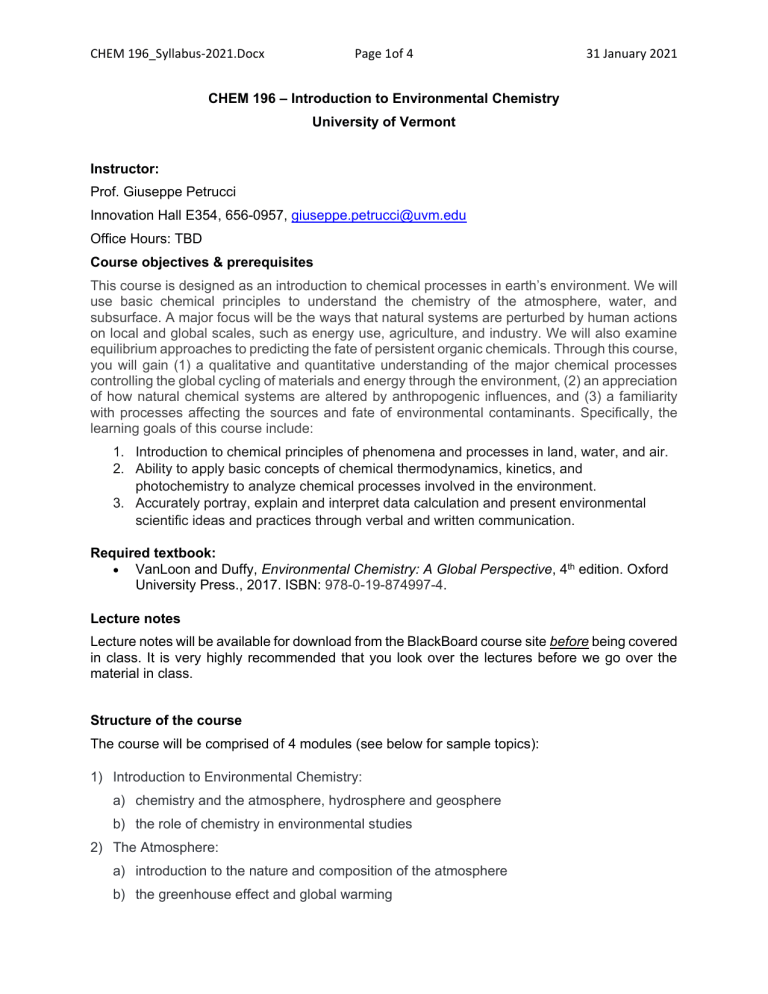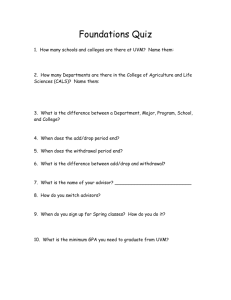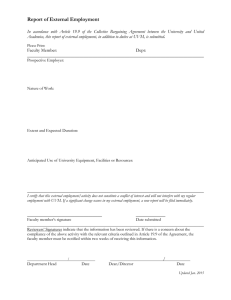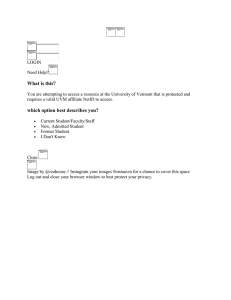Syllabus-2021 found on SD card toelen from chinse trudent in canada
advertisement

CHEM 196_Syllabus-2021.Docx Page 1of 4 31 January 2021 CHEM 196 – Introduction to Environmental Chemistry University of Vermont Instructor: Prof. Giuseppe Petrucci Innovation Hall E354, 656-0957, giuseppe.petrucci@uvm.edu Office Hours: TBD Course objectives & prerequisites This course is designed as an introduction to chemical processes in earth’s environment. We will use basic chemical principles to understand the chemistry of the atmosphere, water, and subsurface. A major focus will be the ways that natural systems are perturbed by human actions on local and global scales, such as energy use, agriculture, and industry. We will also examine equilibrium approaches to predicting the fate of persistent organic chemicals. Through this course, you will gain (1) a qualitative and quantitative understanding of the major chemical processes controlling the global cycling of materials and energy through the environment, (2) an appreciation of how natural chemical systems are altered by anthropogenic influences, and (3) a familiarity with processes affecting the sources and fate of environmental contaminants. Specifically, the learning goals of this course include: 1. Introduction to chemical principles of phenomena and processes in land, water, and air. 2. Ability to apply basic concepts of chemical thermodynamics, kinetics, and photochemistry to analyze chemical processes involved in the environment. 3. Accurately portray, explain and interpret data calculation and present environmental scientific ideas and practices through verbal and written communication. Required textbook: • VanLoon and Duffy, Environmental Chemistry: A Global Perspective, 4th edition. Oxford University Press., 2017. ISBN: 978-0-19-874997-4. Lecture notes Lecture notes will be available for download from the BlackBoard course site before being covered in class. It is very highly recommended that you look over the lectures before we go over the material in class. Structure of the course The course will be comprised of 4 modules (see below for sample topics): 1) Introduction to Environmental Chemistry: a) chemistry and the atmosphere, hydrosphere and geosphere b) the role of chemistry in environmental studies 2) The Atmosphere: a) introduction to the nature and composition of the atmosphere b) the greenhouse effect and global warming CHEM 196_Syllabus-2021.Docx Page 2of 4 31 January 2021 c) the case against global warming d) energy production and global warming 3) The Geosphere: a) development of soils and soil profiles b) characteristics of soils suitable for plant growth c) soil degradation: salinity and sodicity 4) The Hydrosphere: a) fundamentals of aquatic chemistry b) speciation and redox equilibria in natural waters c) gases in water d) organic matter in water e) metals in water f) environmental colloids g) chemical aspects of the nitrogen and phosphorus cycles Policy about Homework Collaboration It is OK to discuss homework problems in small groups, and in fact this will help you learn (teach each other, bounce ideas, etc.) and is more relevant for preparing you for research. However everyone is still responsible for working out, understanding, and writing their own solution separately. If you don't go through the effort of understanding and solving every problem yourself (after discussing it with others if you want) you will find yourself at a large disadvantage in the exams where you have to solve new problems very quickly. To reiterate, it is OK to discuss the problems but not to write solutions together. If you do the latter, it often becomes obvious when grading because multiple people have extremely similar solutions to several problems. Homework and Exam Legibility It is often a significant problem to “decode” homeworks and exams if the writing is too small or messy, or if they are poorly organized. I will take points off for poor legibility, as clear communication is an important skill to polish. For homeworks, I may require electronic submission. The current homework will be posted on the course page to save you the typing. Please list the units of all results. Points will be taken from every response that does not have units or has incorrect units. SI units are required, unless an exception has been discussed in class. In-Class Quizzes (20% of grade): Except for the first week of class, in-class quizzes will be given at the beginning of each Friday class period. These quizzes will be closed book and closed notes and should only last about 10 minutes (unless otherwise specified by the instructor). The purpose of the in-class quizzes is to motivate each student to review their lecture notes from the prior week as well as any required readings from the prior week so they stay up-to-speed on the course material. It is possible we may not have a quiz every Friday; however, you should be prepared each Friday regardless. I will discard your lowest quiz grade before determining your final grade for the course. If you miss a Friday class when a quiz is given, you will receive a grade of zero for that quiz but that grade will be the one I discard. You may be excused for missing a quiz if the reason is valid (e.g., family death, or seriously ill). You will also receive a grade of zero CHEM 196_Syllabus-2021.Docx Page 3of 4 31 January 2021 for each additional quiz missed after the first. We will likely have about 6 quizzes throughout the semester, and as a result, do not worry if you miss or do poorly on one quiz. Course Grading Policy A final grading policy will be established once the course enrollment has stabilized (usually within the first week of classes). As a guide however, the grade will likely be determined as the weighted average of the following parts (subject to change): Grading criteria. ACTIVITIES PERCENTAGES Homeworks/Class participation/Attendance 20 In-class quizzes 20 Exam 1 20 Exam 2 20 Exam 3 20 Late homeworks will not be graded unless we have agreed to an extension before the deadline. If they are graded, the grade will be multiplied by 0.7 to discourage lateness. No exceptions except in cases of personal (not academic) hardship. Not all homeworks or homework questions will be graded (this will not be announced in advance, to encourage the same level of effort on all homeworks). Some Information about Grades Grades should not become an end in themselves (the “professional student syndrome”), rather they should be a feedback tool to help you identify your strengths and weaknesses and to learn. That said, grading is absolute. I will not grade on a curve. The correspondence between numeric and letter grades is as follows: From To From To A 100 93 A- 92 B+ B From To B- 82 80 D+ 69 67 90 C+ 79 77 D 66 64 89 87 C 76 73 D- 63 60 86 83 C- 72 70 F <60 Changes to the Course During the Semester As with life, this syllabus is subject to change. I may make some changes to the course during the semester if I think it appropriate, including to lectures, assignments, and exams. The version CHEM 196_Syllabus-2021.Docx Page 4of 4 31 January 2021 online is the current one. If something is not clear or some information is missing or incorrect in this Syllabus, please let us know. Feedback on the Course As this is the first time this course is offered at UVM, I am very open to your suggestions and comments to improve the course. The purpose of having a course is that it will be useful to you, the students. Thus don’t hesitate to give me feedback early on about what’s working or not working – chances are that I can fine-tune the course as we go along. Classroom Behavior Students and faculty each have responsibility to maintain an appropriate learning environment. Those who fail to adhere to such behavioral standards may be subject to discipline. Professional courtesy and sensitivity are especially important with respect to individuals and topics dealing with differences of race, color, culture, religion, creed, politics, veteran’s status, sexual orientation, gender, gender identity and gender expression, age, disability, and nationalities. I would like to create a learning environment for my students that supports diversity and honors your identities. To help accomplish this: If you have a name and/or set of pronouns that differ from those that appear in your official UVM records, please let me know! If you feel like your performance in the class is being impacted by your experiences outside of class, please don't hesitate to come and talk with me. I want to be a resource for you. Remember that you can also submit anonymous feedback (which will lead to me making a general announcement to the class, if necessary to address your concerns. I (like many people) am still in the process of learning about diverse perspectives and identities. If something was said in class (by anyone) that made you feel uncomfortable, please talk to me about it. (Again, anonymous feedback is always an option). See policies at http://www.uvm.edu/policies/student/studentcode.pdf and http://catalogue.uvm.edu/undergraduate/academicinfo/rightsandresponsibilities/. Discrimination and Harassment The University of Vermont (UVM) is committed to maintaining a positive learning, working, and living environment. The University of Vermont does not discriminate on the basis of race, color, national origin, sex, age, disability, creed, religion, sexual orientation, or veteran status in admission and access to, and treatment and employment in, its educational programs and activities. UVM will not tolerate acts of discrimination or harassment based upon Protected Classes or related retaliation against or by any employee or student. For purposes of this UVM policy, "Protected Classes" refers to race, color, national origin, sex, pregnancy, age, disability, creed, religion, sexual orientation, gender identity, gender expression, or veteran status. Campus resources available to assist individuals regarding discrimination or harassment can be obtained at http://www.uvm.edu/policies/student/studentharas.pdf Honor Code All students of the University of Vermont are responsible for knowing and adhering to the academic integrity policy of this institution. Violations of this policy may include: cheating, plagiarism, aid of academic dishonesty, fabrication, lying, bribery, and threatening behavior. Students who are found to be in violation of the academic integrity policy will be subject to both academic sanctions from the faculty member and non-academic sanctions (including but not limited to university probation, suspension, or expulsion). Other information on Academic Integrity can be found at https://www.uvm.edu/policies/student/acadintegrity.pdf


